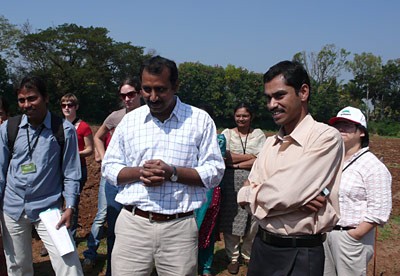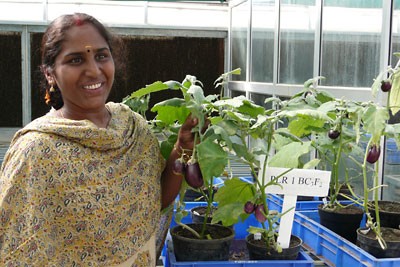Students see firsthand how Asia is developing its first genetically engineered food crop
By Linda McCandless
COIMBATORE, India -- Eggplant, known as brinjal in India, is enormously popular in Asian cuisine. Yet it is increasingly difficult to grow because an insect pest called the fruit and shoot borer destroys about 40 percent of the eggplant harvest in Asia each year. But as a group of Cornell students touring Asia for three weeks in January on a field study tour learned firsthand, genetically engineered eggplant may help change that.
Cornell researchers in plant breeding, entomology and molecular biology are working closely with Sathguru Management Consultants of India to develop several new lines of genetically enhanced eggplant that express a natural insecticide derived from the bacteria Bacillus thuringiensis (Bt), which make the plant more resistant to attack from the insect.
"Bt eggplant is expected to reduce insecticide use by Indian farmers by about 30 percent and double farmers' yields," noted Ronnie Coffman, director of Cornell's International Programs, during the tour of India and Thailand by Cornell, Thai and Indian students participating in Cornell's International Agriculture in the Developing Nations II (IARD 602) class.
The Bt eggplant project has been under way since 2002 in collaboration with the Indian Institute of Vegetable Research, the Bangladesh Agricultural Research Institute, the University of the Philippines and Maharashtra Hybrid Seeds, or Mahyco, one of the largest private hybrid seed companies in India. The consortium has met food, feed and environmental safety approvals and is on track to commercialize the genetically modified food by 2009 in India. That would make Bt eggplant the first genetically engineered food crop in Asia.
Currently planted on about 1.5 million acres in India and Bangladesh, Asian eggplant is smaller and denser than the breadloaf-style of eggplant in the United States. The 29 students in the Cornell class ate eggplant at nearly every meal while in Asia. "It's ubiquitous!" said Kristine Averill, a Cornell graduate student in crop and soil sciences.
Indeed, the durable little fruit seemed to be everywhere, gaily bumping its way along rural dirt roads or pot-holed urban streets in carts or small trucks, hefted high in baskets on women's heads and piled shoulder to shoulder in street markets.
"India and China account for nearly 84 percent of the world's production of brinjal," said P. Balasubramaniam, director of the Centre for Plant Molecular Biology at Tamil Nadu Agricultural University (TNAU), speaking to members of the class in Coimbatore on Jan. 9. "With a population of 1.3 billion people, India's basic need is to increase food security. Biotechnology gives us the tools to develop pest-resistant crops like Bt eggplant and Bt cotton, as well as develop other varieties of crops more tolerant to drought and salt-affected areas, and land of low productivity, which we must learn to cultivate as population pressures increase."
TNAU also is working closely with researchers in the laboratory of Ray Wu, Cornell Liberty Hyde Bailey Professor of Molecular Biology and Genetics, to genetically engineer rice with tolerance to drought and salt.
Currently, Indian farmers are forced to spray 50-60 times per season to protect their eggplant, said Balasubramaniam, which negatively impacts the environment and farmers' health and contributes to higher costs of production.
The Cornell students toured the greenhouses and field trials at TNAU where the pest-resistant eggplant is being tested. Bt eggplant greenhouses and fields were under strict regulatory supervision, and field trials were isolated from other plantings. Security is an ongoing concern because of some opposition to genetically modified agriculture.
The work with Bt eggplant is part of the Agricultural Biotechnology Support Project, funded by the U.S. Agency for International Development and administered through the International Programs of Cornell's College of Agriculture and Life Sciences in partnership with Sathguru.
This is the second in a series of articles by Linda McCandless, director of communications in the College of Agriculture and Life Sciences, who accompanied the students and faculty on their Asian field trip.
Media Contact
Get Cornell news delivered right to your inbox.
Subscribe
